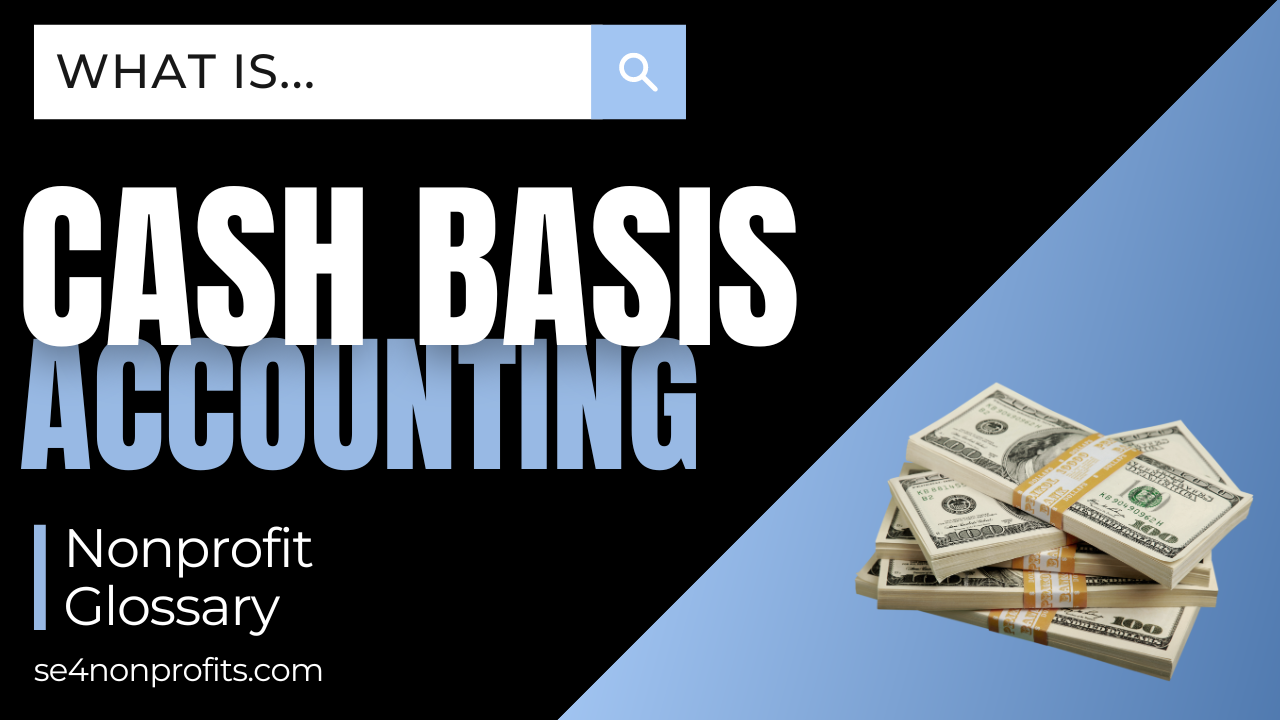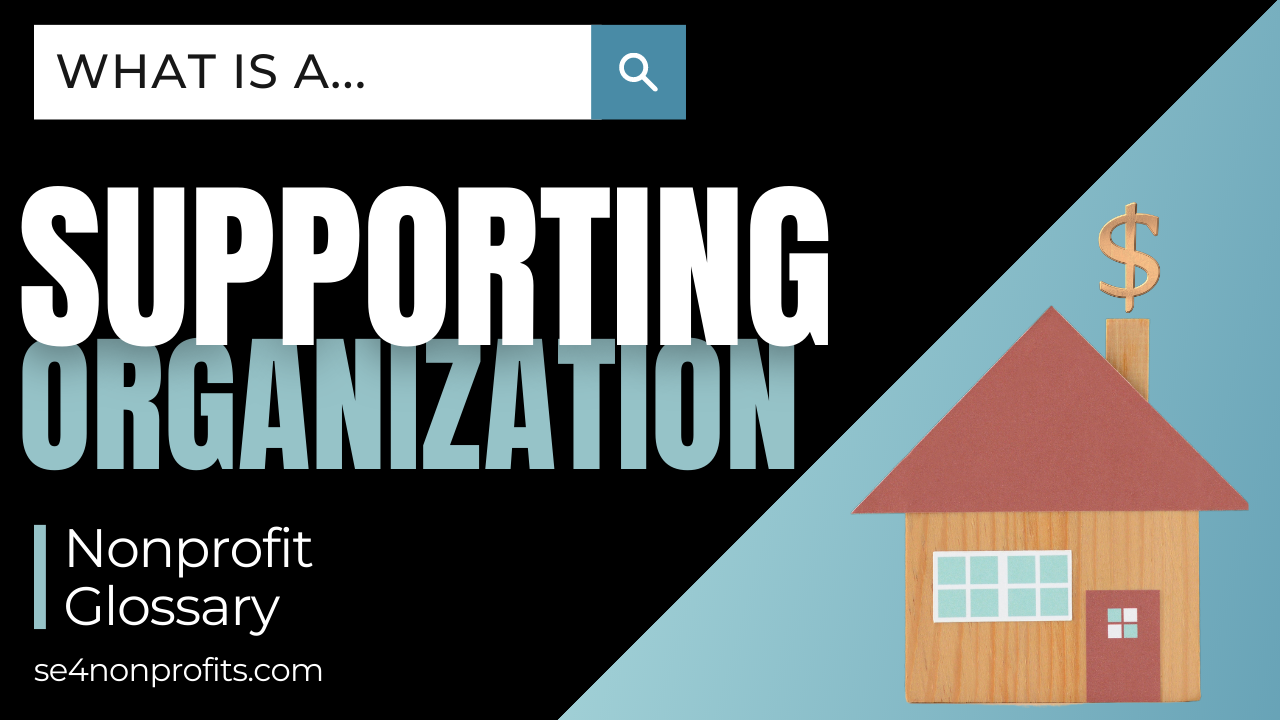
Blog.
Most Recent Posts

VIDEO: What is Cash Basis Accounting? | Nonprofit Glossary
SE4N's A. Michael Gellman provides a short summary of the definition of cash basis accounting, its pros and cons, what types of nonprofit organization's typically use cash basis accounting, and when it may be time to think about switching to accrual basis.

The Importance of Budgets to Nonprofit Organizations
The word “budget” has almost universal recognition. Budgets have a very broad spectrum of usage and applicability beyond just nonprofit organizations, ranging from large entities (governments, Fortune 500 companies, professional sport teams) to small businesses, individual entrepreneurs, and even smaller applications such as families juggling home budgets and providing their children with early exposure to budgets through managing allowances.

Q&A #152 – What happens if a 501(c)(3) public charity exceeds the 501(h) lobbying limits?
501(c)(3) public charities are permitted to engage in “lobbying” up to certain limits. Organizations that make the “501(h) election” are subject to a more concrete set of limits based solely on expenditures made by the organization for lobbying purposes. If an organization exceeds these limits in any one tax year it will have to pay a 25% tax on the excess. A 501(h)-electing organization’s tax-exempt status will not be revoked unless its lobbying expenditures exceed 150% of the limits over a 4-year period.

VIDEO: What is a Supporting Organization? | Nonprofit Glossary
SE4N's Benjamin Takis provides a short summary of what 501(c)(3) “supporting organization” status means, how it relates to a nonprofit organization's public charity status under Form 990, Schedule A, and some of the key requirements applicable to supporting organizations.
![How Intermediate Cash Fund Pools Support Long-Term Investment Portfolios [SUBSCRIBERS-ONLY]](https://images.squarespace-cdn.com/content/v1/5e6ccadfb4659c1d51df14d5/1679405926502-PJHQWA1RBYIN3LWQEPOZ/reservoir-ge08373ff9_1920.jpg)
How Intermediate Cash Fund Pools Support Long-Term Investment Portfolios [SUBSCRIBERS-ONLY]
Nonprofit organizations should expand their cash management policies and procedures to include provisions for establishing and maintaining intermediate cash fund pools. This will not only enhance protection and management of operating (short-term) cash funds, but also act as a conservative buffer for long-term investment strategies, allocation targets, and portfolio risk management.

Q&A #151 – Who should nonprofits name as their principal officer at the top of the Form 990?
The Form 990 instructions state that for purposes of Item F at the heading of the Form 990, the “principal officer” is the person who “regardless of title, has ultimate responsibility for implementing the decisions of the organization's governing body, or for supervising the management, administration, or operation of the organization.” Application of this definition will vary depending on the organization, and this will not necessarily be the same officer who signs the Form 990 at the bottom of page 1.

VIDEO: Drafting Donor Acknowledgment Letters | 5-Minute Lessons 4 Nonprofits
SE4N's Benjamin Takis provides a short lesson on what to include in donor acknowledgment letters, what NOT to include, how to handle quid pro quo contributions, and more.
![How to Make Your Nonprofit Audit Committee More Impactful [SUBSCRIBERS-ONLY]](https://images.squarespace-cdn.com/content/v1/5e6ccadfb4659c1d51df14d5/1677020091627-XTQN5HH1TSD9V623Z7IZ/ran-berkovich-kSLNVacFehs-unsplash.jpg)
How to Make Your Nonprofit Audit Committee More Impactful [SUBSCRIBERS-ONLY]
Audit committees for nonprofit organizations are charged with filling a very important and broad fiscal and financial accountability and governance oversight role. Most nonprofit audit committees center their attention on the back-end of the annual financial statement audit process when they receive draft auditor reports. While this is an important function, audit committees can be more impactful if they shift more of their focus to the front-end of the annual audit process and expand their internal control and business practices oversight roles.

Q&A #150 – Can a nonprofit change its mission without IRS approval?
A 501(c)(3) public charity is generally permitted to change its mission and purpose and undertake new program areas that were not described in its Form 1023 application so long as these changes are consistent with 501(c)(3) status and properly disclosed in the organization’s Form 990. Advance IRS approval is not required, although significant changes in mission, purpose, and programs can affect an organization’s ability to rely on the IRS determination letter approving 501(c)(3) status.

Q&A #149 – Can a nonprofit use a DBA or trade name?
Like any other business or entity, nonprofit organizations are permitted to conduct their activities under a “trade name” (often referred to as a fictitious name, “doing business as,” or “DBA”) so long as the name is properly registered in the relevant states and reported on the Form 990, charitable solicitation registrations, and other required filings, and the name is available to use without infringing on the trademark rights of others.

Any Board Member Can Be a Board Champion
The concept of a “Board champion” for a nonprofit organization is frequently misunderstood. Board champions do not necessarily have to be officers. They can be any responsible Board member who is willing and able to actively engage in helping the organization. Board members have the potential to help in many ways, both small and large, by sharing their experiences, skills, and aspirations for the organization. Even seemingly small ideas and offers to assist can sometimes have just as big of an impact as officer service.

Q&A #148 – How far in advance must Board meeting materials be sent to Board members?
In most cases there are few explicit requirements regarding when meeting materials must be provided to Board members (such as the agenda, minutes of the last meeting, executive director and committee reports, financial reports, and proposed resolutions). Any specific requirements are typically found in an organization’s Bylaws, policies, or meeting guidelines, if at all. State nonprofit corporation statutes do not usually have strict requirements on this issue but check applicable state laws to be sure.

Q&A #147 – Must a Form 1099 be issued for expense reimbursements paid to Board members and volunteers?
IRS guidance suggests that reimbursements paid to Board members and volunteers for expenses properly incurred in connection with organization functions are generally not required to be reported on Form 1099 if the expense reimbursements are made pursuant to a reimbursement arrangement that qualifies as an “accountable plan.” This is similar (but not identical) to the rules that apply to employee expense reimbursements and Form W-2 reporting.
![Regular Communication Between Development and Finance Departments is Essential for Donor Management [SUBSCRIBERS-ONLY]](https://images.squarespace-cdn.com/content/v1/5e6ccadfb4659c1d51df14d5/1708829199672-XQNOJI61DNDSNNBFEDCL/pexels-alex-andrews-821754.jpg)
Regular Communication Between Development and Finance Departments is Essential for Donor Management [SUBSCRIBERS-ONLY]
Donors are one of the most precious sources of funding for publicly supported nonprofit organizations. Managing this resource is critical to sustainability, continuity, and financial health. There are many important elements to donor management, but these elements will be rendered almost useless without consistent pathways of communication and sharing of information between development and finance departments.

Q&A #146 – Is IRS approval required to become a supporting organization?
According to the IRS instructions for Schedule A of the Form 990, an organization that previously used the public support tests under sections 170(b)(1)(A)(vi) or 509(a)(2) of the Internal Revenue Code is not required to receive an IRS determination that it qualifies as a “supporting organization” under section 509(a)(3) before treating itself as supporting organization in Schedule A. However, some organizations may wish to request such an IRS determination using Form 8940.